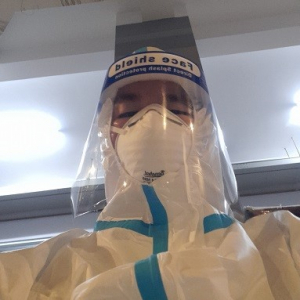Peter MALONE
Hostile Waters

HOSTILE WATERS
US/UK, 1997, 94 minutes, Colour.
Rutger Hauer, Martin Sheen, Colm Feore, Max von Sydow, Rob Campbell, Harris Yulin, Regina Taylor, John Rothman, Dominic Monaghan, Peter Guinness.
Directed by David Drury.
Hostile Waters is a submarine drama. It is one of the rather wide range of HBO movies from the 1990s and the 2000s.
There is an explanation that this story is based on actual events but that they were kept secret and so the screenplay is based on speculation and suggestions. One of the reasons is that the setting is the meeting in Iceland between President Gorbachev and President Reagan and the move towards the end of the Cold War. This episode might well have endangered these peace talks.
This is a story of nuclear submarine is, Americans and Russians both in the Atlantic Ocean. There is what seems a minor collision but it has strong repercussions for the Russians, putting the submarine offkilter, endangering the nuclear warheads and the possibilities of their being fired. Which means that the main part of the action is on the Russian submarine. The commander, skilled, intelligent, calm, is played by Rutger Hauer in a strong role. The Russian drama shows his assessment of the situation, fire breaking out, parts of the submarine separated, his strategy for putting the fire out, submerging but only slightly and then re—emerging, getting experts to go into the area with the nuclear warheads and turned down the pressure. This part is very suspenseful, especially with the young man going in, and the almost superhuman effort to Ward off the nuclear danger.
In the meantime, there is communication with Moscow, an Admiral played by Max von Sydow (anticipating his performance 20 years later in the submarine drama, Kursk). There are experts consulted, information conveyed, ultimate success, the return of the crew to Moscow, acclamation in public, but the commander suspended from duty (although comment was made some years later that the commander sued the filmmakers for an inaccurate depiction).
However, there is also the American action, with Martin Sheen in charge of the American submarine, puzzled about what is happening, more hawkish in his approach to destroy the submarine than his subordinate. And, this is echoed in Washington, Regina Taylor as research and information, Harris Yulin as a Naval authority, some strong hawks who would destroy the submarine instantly. However, there are the politicians who are urging caution because of the forthcoming peace talks.
There is admiration for the action of the Russian captain and the prevention of nuclear warfare.
There have been several submarine films, popular in the 1990s and to thousands, The Hunt for Red October, The Crimson Tide, K-9, The Widowmaker. However, this film anticipates the actual events with the submarine Kursk and the film version of that disaster.
- Based on an actual incident? 1986? Secrecy? The story based on research?
- The atmosphere of 1986, the meeting between Reagan and Gorbachev? Pestroika, détente? World peace? The end of the Cold War?
- The situation with American and Soviet submarines, patrolling in the Atlantic, nuclear warheads? Potential dangers, accidents, nuclear strikes, radioactive airwaves? The statistics at the end and the number of nuclear submarines?
- The focus on the Russians more than the Americans? The sympathetic Russian story, characters, crisis, and limiting the crisis? The contrast with the American submarine, the captain and his aggressive attitudes, members of the crew and advice, restraint? Washington, the military and observations, surveillance? Politicians, clashes between hawks and doves? Discussions, tactics, pressures? The Iceland meeting between the Presidents?
- The Russian crew, the character of the captain, his presence, dealings with the men, with the KGB officer present? Advice to be more genial with him? The chief advisers, their talents and skills? The youngsters and their mucking around with the chef? Later called on for heroism?
- The American crew, their presence, the captain, stern, observing, decisions, aggressive? The second in charge and his restraint? Observing, the tactics, making judgements? Watching the Russian tactics, disbelieving, their success, the long dive, the repercussions, explosions?
- The Pentagon, details of observation, Lieutenant Curtis and her presence, skills? The meetings, the chiefs, their personalities, discussions, hawks and doves, aggression, diplomacy, secrecy? The aftermath?
- Moscow, the admiral, following the accident and the decisions? Technical advice?
- The crisis, the collision with the Americans, the fire, the danger for the nuclear warheads? Splitting of the submarine? The decisions of the captain, his calm? The possibilities with the warheads, strikes, nuclear waves, radioactivity? The decision to dive, advice from the experts in Moscow? The success of the tactic? The further danger with the warheads, limits of oxygen, the two going down, deaths, closing down the warheads? The captain talking with the young man, aged 20, his heroism, death after making so much effort?
- The rescue, the return to Moscow, the plane, the KGB officer, collecting all the documents and the key? The parade on landing, the admiral, praising the men? Relieving the captain of his duties?
- Small budget, tension, submarine stories at this era? And the soon-to-be experience of the Kursk?
Teen Spirit
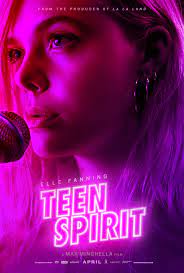
TEEN SPIRIT
UK/US, 2018, 93 minutes, Colour.
Elle Fanning, Agnieszka Grochowska, Zlatko Buric, Rebecca Hall.
Directed by Max Minghella.
Elle Fanning made two films in Britain in the later 2010, How to Talk to Girls at Parties and Teen Spirit. The former was a fantasy about aliens in nightclubs. The latter is about television competitions to discover singing talent.
The film is directed by Max Minghella, son of Anthony Minghella, who also has a career as an actor, Jigsaw – Spiral, The Handmaid’s Tale,
The initial action is on the Isle of Wight, a Polish refugee family, mother and daughter, working on a farm. The daughter has a singing talent, sings locally, in clubs, in a choir. A former opera singer from the Balkans, Zlatko Buric, living somewhat is a vagrant and drinking, sees her talent and offers to be her manager.
The film shows a range of auditions, competitiveness, the young woman needing more time, the old man coaching her, further competitions and, ultimately, going to London.
But, the young woman’s life is complicated, her absent father, her concerned mother, the pressures of the competition, her going out on the town, clashing with her coach, needing him and his final response to her.
Familiar material but interesting to see in the career of Elle Fanning and her versatility in performances.
- A film for younger audiences? Characters, hopes and ambitions? Music and performance?
- British film, the settings on the Isle of Wight? Farms and work, homes, pubs, streets?
- The musical score, the range of songs, Elle Fanning singing her own songs, clubs, auditions, television? The Opera excerpts in the background?
- The title, the British television talent show? Emphasis on teens? And their spirit?
- Violet’s story? Coming from Poland to Britain, the absent father, the chain, the mother’s gift, her wearing it, taking it off for the final performance? Letting her father go? Her relationship with her mother? Work, income, talking Polish? The details of her work on the farm, with the animals?
- Violet and her singing, at the clubs? The encounter with Vlad? His offering to help, the lift home, her wariness? His opera background, drinking, failure? Her taking up his offer, his advice, coaching? Going to the auditions? Singing, shy, the judges, response, advice? The continued practice? Introducing Vlad to her mother? The later visits, his bringing the flowers?
- Violet, friends, musicians, getting ready for work, in the workplace? Her ordinary life?
- Inspired by Teen Spirit, going for the audition, performance, the three finalists, the judgement for the alternate singer? Her rejection? Upset, anger? The phone call, the disqualification, her acceptance, tantalising Vlad and telling him?
- The preparations, travelling to London, the accommodation, Vlad and his support? The rehearsals, meeting the other candidates, make up, clothes, choreography?
- Jules and her cohort, the discussions about the contract, the possibilities, binding, issues of what to lose? Vlad and his disagreement? The further discussions, Violet and her mixed feelings?
- The credibility of her breaking out, the make-up, the dress, going to the club, flirting, drinking, over the top? Vlad arriving, carrying her out? The clash between the two, his going to the park, drinking?
- The final, the preparation, phone call to her mother, violets regrets? Going on stage? Vlad returning, the support? The vitality of her performance, winning? Turning down jewels in the contract?
- Her mother and all the people in the town watching the television?
- The popularity of television talent shows – in this kind of variation on the theme?
Glassboy
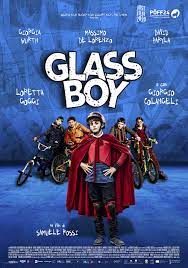
GLASSBOY
Matt 2020, 93 minutes, Colour.
Andrea Arru, Loretta Goggi, Rosa Barbolini, Stefano Trapuzzano, Mia Pomelari, Gabriel Manonnozzi De Cristoforo, Luca Cagnetti, Massimo De Lorenzo, David Paryla, Giorgia Wurth.
Directed by Samuele Rossi.
Glassboy is the story of a boy with haemophilia, the story designed for young audiences, the same age as Pino, the boy, and the friends he makes in the town. Pino is in 11.
The young audience will identify immediately with the credit sequences, Pino does sketches, creates comic book stories. Then we are introduced to the real life of Pino, safe in his house, wearing his cycle helmet and superhero cape, watching the children outside his window, attracted especially to the young girl, Mavi, who is a top cyclist, rivalling one of the older boys of the town. She sees Pino watching and comes into the house making demands on him, discovering the truth.
She belongs to a group of friends called the SNERDS. One is a boy with touches of blue hair who loves music. Another is a bespectacled young girl with the touch of the expert on many subjects. The other is a fat boy, Tubs, frequently the butt of jokes, continually wolfing down food – and, perhaps, the screenplay targeting him with too much mocking. A touch of bullying.
Pino has parents who are loving and protective. However, his grandmother, a Countess, dominates a room whenever she enters, has plans to take Pino to Stockholm for a cure. She is also employed a teacher for many years for private tuition for Pino – and he turns out to be a stock comic character as well, a touch of the comic villain.
But, Pino’s parents welcome the group and they bond. Eventually Pino being allowed to go to school.
Too good to be true! Enter grandmother again, abducting Pino with the help of the teacher, interning him at her Castle in Austria (the Italian town is near the border of Austria), with a plane charter for the flight to Sweden. But the children get the information, get the train to Austria, cycle to the Castle – and it turns into quite a quest, a kind of variation on the Fab Four or any other group of adventures for kids.
They are able to help Pino to escape, pursued by the teacher, some comic chases and crashes, arrival at the railway station where the grandmother collapses – and repentance. Eventually, all the parents arrive, all the reconciliations, Pino able to gather all these adventures into drawing his comic strips again.
Ideal for a children’s audience who would share the adventures and identify with the characters – and parents of these children would enjoy it as well. Perhaps a caution for grandmothers!
- Pino, the nickname, his haemophiliac? Treatment by his family? By his friends, by the bullies at school?
- The opening credits, comicstrip drawings, Pino and his story, heroism? His helmet, his cape, the super hero? And the story becoming a story of children superheroes and their quest?
- The Italian town, near the Austrian border, homes, the streets, the sea, the countryside, the travel to Austria? The Castle in Austria, interiors? The musical score?
- Pino’s story, his age, physical condition, protection by his parents, protection by his grandmother and her dominance? His room, the drawings, the costume? The windows and his view of the square? Watching the children on the bike, supporting Mavi, her winning the race, his joy? Her coming to the house, criticising him? His continuing to watch, the boy and the cheating, the line on the mirror of the teacher’s car, Pino coming out, smashing it and saving Mavi? The response of the bullies? Her response? The friends?
- The SNERDS, name for the group, their age, at school together, their friendship? Mavi as a leader, her story, her mother’s death from cancer, keeping her hair like her mothers, her father and his loss of the job because of Pino’s father, resentment? Domenico, the blue hair, love of music? Mei, glasses, intellectual? Tubs, large, (and the screenplay picking on fat people and their ever-eating)? Preoccupation with food, his fearfulness?
- Pino, bonding with his friends, their outings together, support of their parents, the children in the house, eating, playing, the music, the whole family dancing? The disapproval of the grandmother?
- The teacher, figure of fun, the tutoring, Pino and his being bored, yet absorbing the learning? The teacher and the damage to his car? Not needed anymore, his protests, siding with the grandmother, helping her with the abduction? At the Castle in Austria, pursuing the group in the car, crashing and the hay falling on him?
- The confrontation with the bullies, memories of the bike race, Mavi and her winning?
- Pino and the outing, the umbrella, in the rain, enjoying being wet? His disappearance? Everybody searching? The irony that his grandmother had taken him? The plan to take him to Stockholm for a cure? Booking the plane?
- The grandmother, her story, the photo albums, her concern about her husband and his illness, his death? Wanting to save her grandson?
- The rival boys, the information about the plane to Stockholm, Mavi in the group, the decision to go to Austria, the train ride, their bikes, the trick, the Castle, entering, hiding, meeting with Pino? The escape, being on the back of Mavi’s bike, the exhilaration? The teacher and the pursuit?
- The railway station, the grandmother and her collapse, the change of heart? Pino in his speech to her about life? All the parents arriving, happiness and reconciliation?
- Pino, his sketches, the adventures, the group?
- A film for children of the age of the group, for parents?
Padrenostro
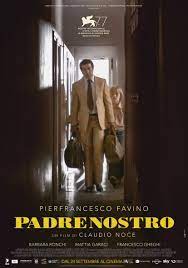
PADRENOSTRO
Italy, 2020, 121 minutes, Colour.
Pierfrancesco Favino, Barbara Ronchi, Mattia Garaci, Francesco Gheghi, Giordano de Plano, Paki Meduri.
Directed by Claudio Noce.
The setting is 1976. The atmosphere in Rome is dangerous. It is the period of terrorist groups, the Red Brigade and others, assassination attempts and abductions.
However, the events and the characters are here shown through the eyes of an 11-year-old boy, Vale, in a loving family, especially devoted to his father. While we are introduced to Vale at school, initially with a medical checkup because he is rather small, a touch of the puny, yet eager to play football, then, shots fired in the street, Vale and his mother going to the balcony, his father shot, terrorists escaping on their motorbikes, one wounded on the street, removing his balaclava, dying.
It is important for the audience, while not ignoring their knowledge of the times and their adult response to these events, to see everything through the eyes of the 11-year-old boy. He doesn’t quite understand. His mother turns off the television coverage. His little sister is bewildered. However, eventually his father does come home, to have Vale’s eyes, not the worse for wear. Life seems to go on, especially with his father giving him the gift of a football.
Vale goes to school, the teaching nun supportive, a lot of the fellow students against him. (We have to deduce although it is spelt out later that his father belongs to the government in some way.)
However, the important thing is the appearance of a 14-year-old who befriends Vale, Christian. He comes and goes mysteriously. He shows Vale how he lives in the woods. The two become firm friends, Christian an expert with the soccer ball. When it seems safer for the family to travel south to join the father’s family, Christian suddenly turns up there. The audience is probably trying to deal with whether Christian is real or not, a figment of Vale’s imagination, an imaginary friend or something of an alter ego. When it does appear that he is real in his visit to the south, it helps to see him from Vale’s point of view, suddenly appearing, disappearing, friendly encounters, a blood oath of friendship.
When Vale’s parents meet Christian, a touch of suspicion, but then he is welcomed, into the house, for meals, at the big family picnic, a football game where he plays on the side of the father, winning, to Vale’s obvious displeasure. Which is aggravated when they go to the father’s favourite fishing spot and the father seems to be favouring Christian again, Vale pushing him into the water, Christian unable to swim and having to be rescued.
It is a challenging time for Vale. How he has treated Christian, going to a cliff where Vale had told the story of a criminal and friend who jumped off the cliff. But, the father is there to rescue again.
Probably most of the audience will have appreciated early on who Christian really is, it finally being confirmed by Vale looking in Christian’s bag and finding the photo of him with his parents (the father the dead terrorist) and the newspaper reports.
In fact, at the beginning and the end, there is a contemporary scene, Vale is a middle-aged man, on a train in Rome, thinking he sees the adult Christian – and he does.
The film is said to be based on a true story. In fact, the director’s father had the experience of the father in the film so this is the director’s attempt to go back to his childhood to relive, re-see, experience the significant events in his early life.
- Award-winning drama? Based on a true story? The father of the director, his role in the 1970s, the police, the attacks by terrorist groups? The effect on his son?
- The drama of 1976, seen through the eyes of the boy, his awareness at that stage of his life, limits, his relationship with his parents, the effect of the attempted killing, the appearance of Christian, a friend, sharing – and Christian appearing and disappearing (reflecting the memory of Vale's experience of Christian)?
- The framework of the film, in the train, Vale, age, tentative, seeing the man exit the train, on the platform, his difficulty breathing, the blackout, people rushing from the station, on the steps, the encounter with the older Christian, Christian giving his hand, walking together, talking together in the street? Memories of the past? But the mystery for the audience throughout the story of Vale’s memories?
- Vale, his love for his father, his mother – lesson comparison with his father, his sister? At school, the physical test, height and weight, health? The report on going home? Domestic life, in the bath with his sister? The meals? His love for football, dribbling the ball? Going to games with his father?
- The dramatic impact of the shooting, Vale and his mother going out to the balcony, going down, the memory of the death of the terrorist taking of his balaclava? The mystery about his father? Later seeing the television news and his mother stopping it? His father, his role with the government, chauffeur, bodyguards? The 1970s, terrorist groups, the Red Brigade…? Memories of the times?
- The family, Alfonso’s recovery, return home, the gift of the football? His presence at home, having to leave for work? The caution, the dangers?
- Vale, with his football, the appearance of Christian, Christian and his age, the way he was dressed, the bag over his shoulder? Dribbling the ball? Seeming to appear and disappear? Sharing with Vale, his story, sleeping in the woods? The bond between the two boys? The later revelation of who he was (and the audience guessing)? The image of his father and mother? His carrying the photo of the family? And the newspaper items about the shooting?
- The dangers, the decision to leave Rome? The episode with the driving, the fear, thinking it was bullets, the plank on the road? Driving south, the tunnels, trapped in the tunnel, Vale and the claustrophobia, his walking, brought back? Father and son and the difficulties of breathing, breathing through the belly, reassuring each other?
- The arrival in the south, the grandparents, uncles and aunts, the wider family, the meals? The memory of the first grandmother and her giving birth? The talk of ghosts?
- Happiness in the south, at the beach, and the water, Vale riding his bike?
- The assassinations in Rome, the phone calls, need for greater protection?
- Christian, reappearing, his story getting the train, sharing with Vale, at the beach, is not going into the water, riding the bike, Vale putting him in the shared, ringing him food? The blood bond between them?
- Christian meeting Alfonso, Vale’s explanation, bringing Christian into the house, into the way of life? Alfonso taking the boys to the special place, the fishing, Alfonso’s attention to Christian, the soccer match and Alfonso playing with Christian, there winning, Vale’s reaction? They’ll and the touches of jealousy, pushing Christian into the water, his not being able to swim, Alfonso rescuing him? The effect on Vale?
- The visit to the top of the cliff, Vale and his story about the criminal on the boy, and then going over the cliff and drowning? The effect on Christian, his going to the cliff, Vale pursuing him, his father coming, saving them?
- Vale and his looking in Christian’s bag, discovering the truth? His father and mother discovering the truth?
- The memories of childhood, going back to the railway station, Vale and his meeting Christian again? The bond?
Off the Rails
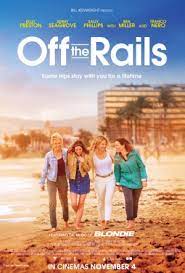
OFF THE RAILS
UK, 2021, 94 minutes, Colour.
Jenny Seagrove, Sally Phillips, Kelly Preston, Elizabeth Dormer-Phillips, Judi Dench, Peter Bowles, Ben Miller, Martin Shaw, Franco Nero.
Directed by Jules Williamson.
The title indicates where this film is going – off the rails! However, it could have just as well been called Girls Trip, Girls (Many) Nights Out. The target audience, very quickly established, is female, of an indeterminate age. There are various clues early in the piece: the explanation for the soundtrack, more than a dozen songs by Blondie, their favourite when they were young – and they are now at grandmother age, menopause discussions.
It is fair to add a comment from an IMDb blogger that challenges male perspectives on the film: ‘I also secretly love that middle aged male critics don't get it. This one is for us!’
This is one of those stories where women friends from the past who have grown rather apart, have some secrets, also some resentments, are brought together on the occasion of the death of one of their friends. The film has some sobriety at the beginning with Judi Dench offering a eulogy at the funeral of her daughter, some moments of Peter Bowles as the vicar. And, at the ceremony, the deceased woman’s daughter, Maddie, 18, plays the organ and a song which the three friends are able to sing.
There is a credit for the “original story” which seems rather a stretch. We have seen this kind of film before, the dead woman leaving tickets for her three friends to take her daughter to relive one of the trips of the past, the goal in Palma Cathedral.
It is a long time since the three were friends, back in the travelling days, back in the Blondie days, drinking, kicking over the traces. They are not quite like that now. Kate, Jenny Seagrove, is rather serious and solemn. Cassie, an American, is the longtime star of a television show, moody and peremptory when she wants to. She is played by Kelly Preston in her last role and the film is dedicated to her. There is some enjoyment with Sally Phillips who was settled down to marriage and ordinary life (but about to be shocked by her husband). Maddie is played by newcomer, Elizabeth Dormer-Phillips.
So, some random adventures with comic touches, especially when they miss quite a number of trains, when a train breaks down, when they miss the ferry to Palma… And sequences in Paris, especially a potential spree in a fashionable dress shop, nightclubs, the encounter with a British guitarist, and then a train into Italy, the one that breaks down. On board there is a young man who attracts Maddie’s attention, more than attention. And there is a pregnant woman, the passengers all trek along the train lines and out into the field, helping her give birth, Liz acting as midwife. Consequent rejoicing, a huge party, outdoors, in the town, where the mayor turns out to be Franco Nero.
More adventures, more missed trains, and the missing of the ferry, Franco Nero coming to the rescue with a World War II plane flying them to Spain, the guitarist turning up with his motorbike so that they get to the Cathedral.
And, the sun shining and reflecting through the rose window of the Cathedral is a beautiful site.
Seems a slight entertainment. However, it would also seem that for those who identify with the characters, a good show.
- Target audience? Women? Middle-aged? A European holiday? In memory of the past?
- London settings, the city, the village church, Paris, shops and restaurants, Italy, nightclubs, the sea, Barcelona, the airport, Palma, the Cathedral?
- The musical score? Use of many Blondie songs?
- The introduction to Kate, lacking money at the ATM, Cassie and her moods at the television, Liz, at home? The phone calls, the information about Anna’s death?
- The church, the congregation, the vicar and his words, Maddie playing the organ, the women singing, Anna’s mother, her eulogy and regrets, giving the tickets to the women?
- The situation, tickets, reliving the past, taking Maddie to experience their past and her mother’s past?
- The personalities of the three women, Kate, relationships in the past, betrayals, Cassie still having her letters for the custody hearings, jobs, money, reserve? Cassie, American, the television show, moodiness? Liz, her husband, children, phone calls, the discovery of the betrayal by her husband?
- Maddie, 18, looking after her mother, not finishing her education? Eagerness to go on the trip?
- Eccentricities, personalities, money issues, on the trains, accommodation, Paris, going to the shop, all the dresses, their treatment of the saleswoman, the cutting up the credit card, Cassie putting the ash on her upper lip, Hitler?
- Clubs, dancing, memories of the past? Meeting Dan, the guitar, the drinking, the karaoke and Kate’s singing? The upset in the club, Liz breaking her wrist, with the police, surly attitudes, cuffing Cassie, the policeman recognising her from the television series? The selfies?
- On the train, to Italy, the quest to go to Palma? The train breaking down, the birthing sequence? Everybody’s gratitude? To the celebration, the mayor and his speeches, the young man on the train and the attraction to Maddie? The mayor, the welcome to Cassie, her staying the night, saying nothing happened?
- Being late for the train again, the upsets, telling Liz the truth? Maddie going off, getting a lift to Palma? The brainwave, asking Giovanni for help, the old plane and the pilot, phoning Dan, the bike, their arriving in the city, in the Cathedral, with Maddie again? The beauty of the light through the rose windows?
- Maddie, the necklace, her mother’s ashes, the difficulties at the French customs, giving the ashes to each of the women, scattering them? Mission accomplished?
Fellini Forward
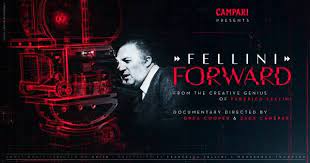
FELLINI FORWARD
Italy, 2021, 45 minutes, Colour.
Maximillian Niemann, Zackary, Canepari, Drea Cooper.
2020 saw the centenary of the birth of celebrated Italian director, Federico Fellini. He was featured at various festivals around the world, revivals of his films, documentaries and interviews.
2021 saw this 45 minute documentary at the Venice Film Festival.
In many ways it is a tribute to Fellini, admiration for his films, admiration for his genius, his directorial eye, his perceptions of the world, serious and comic. And the question arises, can artificial intelligence re-create, re-interpret the Fellini genius and come up with a new film.
Which raises the question of computer technology, algorithms, the downloading of data, preservation of data, experiments to draw on the data and produce something new.
There are many talking heads in the film, experts on Fellini, professors of cinema, reviewers, interviews with some of those who worked with Fellini, especially production designer, Dante Ferretti. Significant and authoritative is the voice of Fellini’s niece, Federica Fabbri Fellini.
There are many roundtable discussions, especially with the designated director of the film, his perspectives and hopes. There is an actor who will take the place of Fellini as Well Is an actress who will be a woman in red. There is also an admiral, Japanese.
In fact, the group produces a 10 minute film in the Fellini 8 ½ mode. It does look and sound like a Fellini film – something of an imitation, something of a tribute. It means that AI can be creative.
But, ultimately, many of the speakers point out that while the films themselves had many collaborators, screenwriters, improvisations on set, unexpected contributions which could parallel the interventions by AI, there is the individuality of the director, the particular aspects of genius, personal touches, that AI can reproduce, imitate, but, we might say, are not the real thing.
Certainly, an interesting documentary and a reminder of so many aspects of Fellini’s genius.
MSC Students continue covid-19 care, Vietnam
MSC Students continue covid-19 care, Vietnam

With New South Wales and Victoria moving out of restrictions and learning to live with covid, we realise hospitals will continue with treating infections, with patients dying.

Our Vietnamese students and their covid ministry keep us alert to hospital care, gravity of cases, personal care (and protection of frontline workers.

Hung writes: Vũ and I are well here. The number of patients with Covid 19 are reducing but it could increase when Vietnam opens again. We hope we can manage this situation.

I send you some pictures.


Midnight Mass
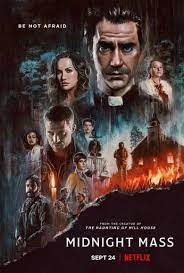
MIDNIGHT MASS
US, 2021, 7x60 minutes, Colour.
Hamish Linklater, Katie Siegel, Zach Gilford, Samantha Sloyan, Kristin Lehman, Henry Thomas, Igby Rigney, Rahul Kohli, Annabeth Gish, Alex Essoe, Annarah Cymone, Rahul Abburi, Matt Biedel, Michael Trucco, Quinton Boisclair, Robert Longstreet.
Directed by Mike Flanagan.
Midnight Mass was a very popular 2021 limited series for Netflix. It was written and directed by Mike Flanagan, who has specialised in horror stories including Oculus, The Haunting of Bly Manor, The Haunting of Hill House and the Stephen King adaptation, Gerald’s Game. He often collaborates, as he does here, with his wife, Katie Siegel.
The setting is Crockett Island, off the American coast, a small close-knit community, the community held together by a veteran Monsignor who has travelled on a pilgrimage to Israel but taken ill and hospitalised. The sheriff of the town is a Muslim. A substitute priest arrives, Father Paul, young, enthusiastic, saying all the right religious and spiritual things, wearing a gold chasuble in the liturgy’s Ordinary Time, noted by the parish assistant, Bev, who emerges as a holier-than-thou, humorless controller.
The first part of the series fills in the background of key characters from the island, starting with the young man, Riley, who has left the island, has been involved in a drunk-driving accident and has served a jail term, now returning home. His mother is portrayed as the typical and traditional devout Catholic mother. The father, rather more quiet, upset by his son’s behaviour, is a local fisherman. The younger son, teenager at school, altar boy at the church, but who sneaks out with friends, including the sheriff’s son, to do drug deals.
Other key characters on the island include the teacher, Erin, who has returned to the island after experiencing a pregnancy. There is also the local doctor, glimpsed at one stage with a lesbian friend, who serves the people of the island but looks after her ageing mother who has touches of dementia. There are also a number of big and burly men around the island, one who has accidentally shot a young girl and crippled her, her father being the Mayor.
There are many scenes of liturgy, generally with sound technical advice, giving a feeling of authenticity. While there is some strictness in practice, there is also an acceptance of more recent changes such as communion in the hand, communion from the chalice, lay readers, there being a female communion minister, Bev.
At the time of Father Paul’s arrival, there seem to be some extraordinary events, and the word miraculous is used. Father Paul urges the crippled girl to stand and come forward to receive communion. She is healed. The doctor’s mother begins to revert, becoming younger. On the other hand, there are some deaths, cats, some poison associated with rats, kept in a cupboard locked by the controller.
One of the features of the series which alienated audiences who simply want action and horror is that there are many long speeches, seeming monologues, tackling the issues of life and death, God, the transcendent, issues of sin and evil, many of them between Riley and Erin. Paul also persuades Riley to join in an AA session, which involves a lot of discussion about guilt, responsibility, faith. And the shooter of the young girl is also persuaded to join.
At an early stage, there is a flashback to the monsignor’s journey, especially to Damascus, with the overtones of Paul’s conversion experience, the monsignor taking refuge in a cave, encountering a large mysterious creature (interpreted by him and others as an angel, for the audience it looks rather more demonic), it also has vampire qualities, and its blood is stored and mysteriously transported in a chest to the island.
About halfway through, there is a highly violent sequence, changing the tone of the whole series, moving it into some of the realms of religious horror. The Angel/demonic creature will continually appear, threatening the congregation, killing, vampire blood.
Religious issues are to the fore with the presentation of Catholic tradition, Catholic doctrine. There is an interesting challenge with the presence of the Muslim sheriff, his stories about his police career, prejudice against him after 9/11, his presence on the island, his observing the rituals of prayer during the day, wanting his son to follow his footsteps, the son wanting to be part of the island life, friends with his peers, joining them, wanting to go to the church.
Most of the action of the film takes place during Lent, quite a ritual ceremony and explanation for the ashes on Ash Wednesday (and a strange custom of a local fair and feast on that day, everybody with their ashes on their forehead). The action progresses through Lent until Holy Week, the advertisement for a Mass on Good Friday (which is where the action veers from the orthodox) leading to the preparation for the Easter Vigil, the Midnight Mass, which is something altogether different, a culmination of the changes in the life of the island, the miracles, Father Paul advocating a different kind of baptismal ceremony, more a vampiric experience, the congregation killing each other, drinking the blood, reviving into a bizarre resuscitation, resurrection.
In the meantime, it has been revealed that Father Paul is actually the rejuvenated monsignor, coming to do good for the island, but caught up in the bizarre Damascus experience, able to speak authentically about the gospel and spirituality, but wanting to transform the island, the end justifying the brutal means. The consequences have Riley understanding what was going on, his warning Erin, his confronting Father Paul and revealing the truth, his death.
The last episode has the mayhem of the Easter Vigil, the mass killings, revivals, zombies, Father Paul regretting what was happening, his being shot by the rejuvenated mother of the doctor – with the revelation that they had an affair in the past and the doctor is their daughter.
As regards the future, the various characters have their death experiences, Riley’s parents, Erin herself, the doctor and her mother. However, in the confrontation with the Angel/Demon, Erin is able to snip the wings so that when it flies, it crashes.
The only survivors are the family’s young son and the girl who was cured but who now reverts to her disabled state.
The series was very popular leading to a great deal of discussion.
Incarceration Nation
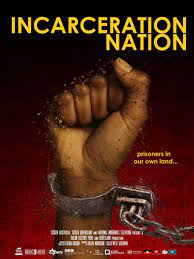
INCARCERATION NATION
Australia, 2021, 90 minutes, Colour.
Directed by Dean Gibson.
Yes, it can be said that Australia has had a history of incarceration, from the arrival of the First Fleet and the subjugation of the long-standing indigenous peoples of the land, the arrival of incarcerated convicts on the initial fleets, of stories of criminals over the last two centuries, there are a lot of prisons in Australia, a lot of incarceration.
However, one of the key issues is that of aboriginal deaths in custody. This documentary takes up this theme, looking back to the enquiry into black deaths of the early 1990s, the recommendations, the recommendations not being followed, further judicial investigations, the investigation into Don Dale Youth Detention Centre in the Northern Territory. And, there are the dreadful statistics of the number of deaths, out of all proportions compared with white deaths in custody even in recent years.
From the NITV site: Aboriginal and Torres Strait Islander peoples are amongst the most incarcerated people in the world. Whilst representing 3.3 per cent of the Australian population, Indigenous men make up 27 per cent of prisoners and women constitute 34 per cent. Approximately 65 per cent of incarcerated children aged between 10 and 13 in Australia are Aboriginal or Torres Strait Islander. Indigenous youth make up 55 per cent of Australia’s youth prison population. There have been at least 478 Indigenous deaths in custody in Australia from 1991 to 20216 — and no criminal convictions for the accused. Incarceration Nation puts First Nations voices front and centre, as they fight for change, visibility and equality.
This is a documentary that should be seen by all Australians.
The advantage of documentary is that it can draw on film and television footage from the last three decades, reminding audiences of the progress, and lack of progress, the nature of the deaths in custody, the reasons, the often seeming apathy of those in charge and responsible, and alarming moments of cruelty and indifference. The main episodes featured, especially through surveillance footage on the actual events, are a challenge to any sense of decency.
While these sequences are highly emotional, especially some of the treatment of children, hours of detention, solitary, physical cruelty and brutality by guards, the documentary is very strong on statistics. They are difficult to take in as they flash up on the screen, so many of them, so overwhelming, always alarming.
Most documentaries depend on the impact that the “talking heads” make. There is a wide variety of men and women who have been invited to contribute, from all walks of life, including Commissioner Mick Gooda, former Redfern boy, Keenan Mundine, who served time, all challenging in their observations, and there pleas for betterment.
Which means that for those who want to use the film for education purposes, something which can be highly recommended, for schools, for discussion groups, for those involved in social welfare, for those involved in legislation for change… It is good to have a copy, to be able to stop and start, to take in the facts, to have time to ponder the implications.
This is a documentary that covers the long past, but, particularly, the last 30 years, a rising of the status quo as we begin the 2020s.
Streamline

STREAMLINE
Australia, 2021, 86 minutes, Colour.
Levi Miller, Laura Gordon, Jason Isaacs, Jake Ryan, Tasia Zala, Robert Morgan, Hunter Page-Lochard, Steve Bass Tony, Sam Parsonson, Isaac Drandic.
Directed by Tyson Wade Johnston.
A strong, very strong, drama about a young athlete, 15 turning 16, a swimmer, Olympic talent and possibilities. But, there is his family and the burdens he is carrying from the past. A Queensland setting.
For the first 15 minutes, the focus is on swimming and training, close-up, intense, coach demanding, shouting. The exercises, the massage, the strict regimen, up early hours, his mother driving him to the pool, watching, careful, discipline. If an audience wanted to know what it is like to be a contender for competition swimming and the demands that it makes, this 15 minutes certainly demonstrates it powerfully.
But, this is also the story of a boy growing up in a dysfunctional family. The boy, Ben, has tormenting memories, nightmares, his father attempting to drown him in the bath, his older half-brothers, No wonder he does not smile, generally a stoic expressionless face. He goes to school, has a strong friendship with Patty, fellow-student, daughter of his teacher (who is heard giving a class on Jung, the conscious, repression and suppression, the unconscious). He lives with his mother who is always supportive.
The point about athletes and competitiveness is that they need to want to be a champion. If not, stop, pull out. And, to the dismay of his mother, the coach, Patty, he does. And not only does he pull out, he packs his bags, his mother upset and badmouthing him, going off to live with his brothers who work in the mill, a reckless life of drinking and fights. The key element is that his father has been released from jail. And it is clear, whatever the repression, whatever the bitterness towards his father, Ben needs a father presence in his life.
The film has a comparatively brief running time and packs a lot into this picture of the dysfunctional family into violent episodes, including the sons confronting their released father, whom they despise, at the diner where he works in the kitchen. But, there is some hope in the screenplay, Patty being always a strong challenging presence to Ben, his mother trying to make amends, and a powerful scene in a frank confrontation with his father.
We know in our hearts that Ben will return to the pool but we need to see how he gets back, why he gets back, the consequences for him. With those powerful 15 minutes at the opening of the film, there is no need for us to go through the rigorous training again, but just to see where his talent might lead him. We hope.
The film is well written, well directed, a first-time film from Tyson Wade Johnston. We hope that this is the beginning of a strong film career. Levi Miller, already a film star with such films as Pan, Better Watch Out, Red Dog: True Blue, Jasper Jones, creates a challengingly enigmatic character in Ben. Laura Gordon is his mother, and Jason Isaacs quite compelling as his father. Tasia Zular is Patty. There is quite a gallery of well-written supporting characters with persuasive performances.
Olympic gold-metal swimming champion, Ian Thorpe, serves as an executive producer and spent time with Levi Miller coaching him in the finer points of swimming performance.
- The title? Swimmers? Olympic swimmers, talent, technique, training, perseverance, achievement?
- A Queensland story? Ian Thorpe, his background, executive producer, helping to train Levi Miller, his cameo? Audience seeing aspects of the film as reflecting Thorpe’s career, emerging young as a champion, his medals? Post-swimming career, sexual orientation issues, depression, business success?
- The first 15 minutes, then going to the pool, with his mother, age, 15 turning 16, the discipline, the coach and his vigorous shouting and encouragement, demands, the physical care, exercise, massage? The detail of the lapse, the swimming techniques? These minutes sufficient to give credibility to the rest of the film, especially Ben and his final comeback?
- The dysfunctional family background? Ben, memories of his father, the picnics, the half-brothers, yet his father’s attack on him in the bath? His father in jail? Being released and Ben watching it on his phone in class? The reputation of the brothers, their working in the mill? Ben, morose, not-smiling, in class (and the teacher, aboriginal, talking about Jung, the conscious and subconscious, suppression and repression)? After school, the yard, physical fights? Patty, the teacher’s daughter, aboriginal family? Common-sensed? Liking Ben, being with him, good advice, supporting him? Ready to challenge him?
- Ben and depression, the need for a father-figure in his life, support from his mother, yet her demands, the fight, his packing, her shouting at him, his going to stay with his brothers?
- The brothers, big and tough, the lifestyle, work in the mill, drinking, drugs, friends? Taking Ben in? The passing of time, getting Ben to drink, the women, homosexual atmosphere in the background? The teaching Ben to drive? Taking him to school?
- Ben, at school, morose, Patty and the challenges? Her family? Sympathetic father, the challenge from Patty’s brother? The invitation to the birthday party? His drinking, the woman, the touch of desperation, getting the car, the crashes, his mother visiting with the cake and the older brother’s treatment of the cake?
- Ben, his brothers, the confrontation with their father, his working in the diner, their humiliating him, throwing the food over him? The impact for Ben?
- Ben, going to see his father, the talk, surfacing of the memories, the father and his grief, apology, their reconciliation, his father delivering him home to his mother?
- Encouragement, his mother, Patty, the coach? Resuming his training, his dream?
- A sports film? A dysfunctional family drama conflict? A portrait of a person with talent, dreams, really wanting the dreams, able to give them up or not? Perseverance and achievement?
